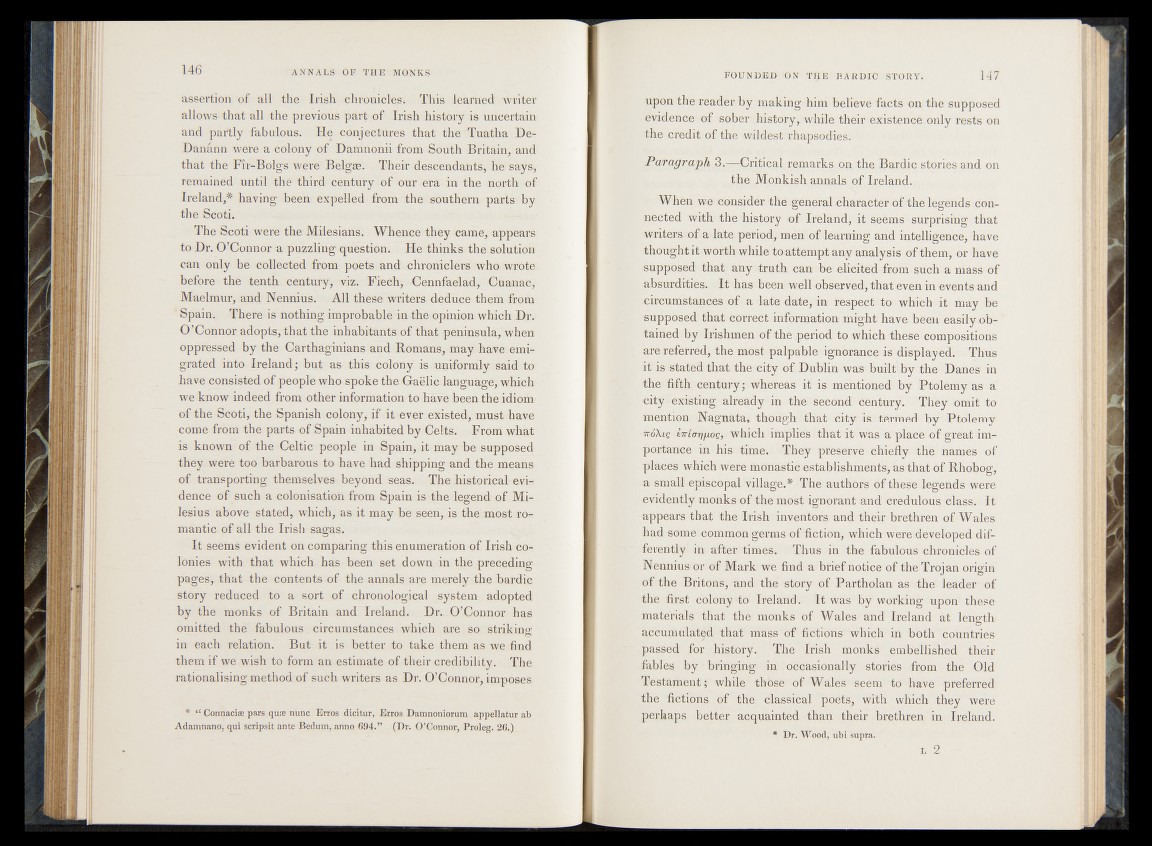
assertion of all the Irish chronicles. This learned writer
allows-that all the previous part.of Irish history is uncertain
and partly fabulous, lie conjectures that the Tuatha Dé-
Danânn were a colony of Damnonii from South Britain, and
that the Fir-Bolgs were Belgset Their descendants, hë'sàys,
remained until the third century of^Our era in the north of
Ireland,* having been expelled from th e ' southern parts/b#
the Scoti.
The Scoti were the Milesians. Whence they came, appears
to Dr. O’Connor a puzzling question. He thinks the solutioh
can only be collected from poets! and chroniclers ^ h o wB^te
before the tenth century, viz. Finch, Cennfaelad, Cuanao,
Maelmur, and Nennius. All these writers deduce them from’
* Spain. There is nothing improbable in the opinion which Dis?
O’Connor adopts-, that the inhabitants of that peninsula, when
oppressed by the Carthaginians and Romans, may have emigrated
into Ireland; but as thistéolony is -.uniformly said.to;
have consisted of people who spoke the Gaëlic language, which
we know indeed from other information to have been the idiom?
of the Scoti, the Spanish colony, if it eve^etf*fc#|:&must4ave
come from the parts of Spain inhabited by Celts. From what
is known of the Celtic people in S p a in ,itm ay b é î supposed
they were too barbarous to have had shipping and the means
of transporting, themselves beyond seas. Thejnstoricakevk
from Spain is dhe.:lggend- of Mi-
lesius above stated, which, as it may be aeen^is the most romantic
of all the Irish sagas.
It seems evident on comparing this enumeration of Irish colonies
with that which has-been set down in the preceding-
pages, that the contents of the annals are merely the bardic
story reduced to a sort of chronological system adopted
by the monks of Britain and Ireland. Dr. O’Connor has
omitted the fabulous circumstances which are so striking
in each relation. But it is. better to take them as we find
them if we wish to form an estimate ofdbeir credibility. The
rationalising method of such writers as Dr. O’Connor, imposes
* “ Conqaciæ pars quæ nnhc Err os. dicitur, Erros Damnoiiiorum appellatur ab
AdamnanO, qui scripsit ante Beduro, anno 694.” (Dr. O’Connor, Proleg. 26»)
ppon the reader by making* him believe facts on the supposed
évidence of sober; history, while their existeneftonly rests on
the credit1 of the wildest rhapsodies.
^Paragraph 3.;—pnjical remarks on the Bardi^^tor^e^,and on
,S(*Jhe Monkish apnals of Ireland.
When we consider the general character of the legends connected
with the history- of Ireland, ibséèms surprising that
writerSiso# adùte period,- m eh o f learning and intelligence, have
^thought it worth while to attempt any analysis iof them, or have
supposed that any truth canM£e elicited from .such a mass of
absurdities. ^4t has,been -well observed, that even in events and
.circumstances of a k fe datepin -, respect • to which it may .be
supposed th a t’correct information might, have fekliéasilyob-
taidedby Irishmen of the period to which these compositions
arë refe’rredj the most palpable ignorance is dispkyeâê-i Thus
it Instated that the city o f Dublin was builtlby the Danes in
th e 1 fifth: century ; whereas if is. mentioned by Ptolemyas a
city existing already in thé second century. They omit to
mention Nugnata, though?, that ê ity as termed by- Ptolemy
méktg t’KÎarijxoç, which implib'sithat it was 'a'.place-oftgreat im-
portaniee in hisuribm They’ preserve chiefly the- names; of
.places which were monastic establishment^,1 Us that of Rhobog*
a small episoopal village.* IT he authors of thèse legends wore
ievadently monks o f the;mOM-ignorant and credulous class’.. I t
appears that the Irish inventors and their bréthren o f W ales
had some eommon germs of Action, which were developed differently
in affeiftimes.’ Thus-in the fabulous chronicles of
Nennius or of Mark we find a brief notice of the-Trojan origin
of the Britons, and the stOry of Partholan as the leader of
the first colony do- Ireland. It was by working upon thesp"
materials that thé monks of Wales and Ireland
accumulated that' mass of fictions' which1 in both^ofmtries
passed for history. The Irish monks■!»embellished their
•fables by bringing in occasionally stories, from the Old
Testament? while those of Wales »seem to have preferred
the fictions of the classical 'poéts, with which the ƒ R were
perhaps better acquainted -than their, (brethren, in Ireland.
* Dr. Wood, u-bi supra. ~
B a i l